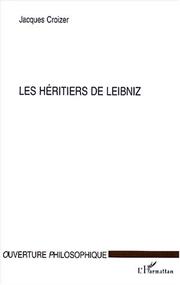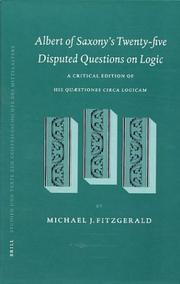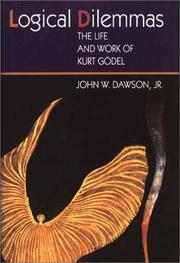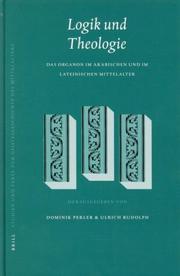| Listing 1 - 8 of 8 |
Sort by
|

ISBN: 2747516431 Year: 2001 Publisher: Paris : Editions L'Harmattan,
Abstract | Keywords | Export | Availability | Bookmark
 Loading...
Loading...Choose an application
- Reference Manager
- EndNote
- RefWorks (Direct export to RefWorks)
Logic --- Philosophy, Modern --- Logicians --- Logique --- Philosophie moderne --- Logiciens --- History --- Histoire --- Leibniz, Gottfried Wilhelm, --- Influence --- Influence.
Book
ISBN: 9782020923392 2020923394 Year: 2007 Publisher: Paris: Seuil,
Abstract | Keywords | Export | Availability | Bookmark
 Loading...
Loading...Choose an application
- Reference Manager
- EndNote
- RefWorks (Direct export to RefWorks)
Kurt Gödel (1906-1978) fut sans doute l'un des plus grands logiciens de l'histoire. Son théorème d'incomplétude, publié en 1931, est peut-être la proposition mathématique la plus significative du XXe siècle. Il a bouleversé les fondements des mathématiques et fait l'objet de commentaires philosophiques sans fin comme d'exploitations abusives sans nombre. Gödel ne publiera que peu pendant la cinquantaine d'années qui suivront. Mais il laissera des milliers de pages de notes philosophiques inédites. On connaissait déjà les excentricités de la vie de Gödel, qui, craignant d'être empoisonné, mourra quasiment d'inanition. Ses notes, décryptées et étudiées ici pour la première fois en français, révèlent une pensée encore plus surprenante. Elles montrent que Gödel croyait aux anges comme au diable - parmi bien d'autres étrangetés. Il tente au cours des années de constituer ces idées bizarres en système logiquement cohérent, dont l'analyse éclaire d'un jour nouveau ses découvertes mathématiques. Cette apparente " folie " d'un esprit génial pose de redoutables questions sur la nature même de la pensée logique. L'auteur de cet essai les aborde sans hésiter à y impliquer sa propre subjectivité, sous formes de courtes fictions fantasmées. Un livre aussi inquiétant que stimulant.
Logicians --- Logic, Symbolic and mathematical. --- Science --- Logiciens --- Logique symbolique et mathématique --- Sciences --- Biography. --- Philosophy --- Biographie --- Philosophie --- Gödel, Kurt. --- Gödel, Kurt, --- Logique symbolique et mathématique --- Gödel, Kurt. --- Gödel, Kurt, - 1906-1978
Book
ISBN: 9782251449760 2251449760 Year: 2019 Publisher: Paris : Les Belles Lettres,
Abstract | Keywords | Export | Availability | Bookmark
 Loading...
Loading...Choose an application
- Reference Manager
- EndNote
- RefWorks (Direct export to RefWorks)
Sextus Empiricus (IIe-IIIe s. ap J.-C.) est le dernier philosophe sceptique de l'Antiquité et le seul dont l'oeuvre soit en grande partie conservée. Son Contre les dogmatiques prend pour cible la connaissance philosophique. Cet ensemble de traités très argumenté est articulé suivant la distinction, d'époque hellénistique, entre trois parties de la philosophie, la logique, la physique et l'éthique.On donne ici la première traduction française de la première et plus importante partie de cet ouvrage, le Contre les logiciens, qui conteste la possibilité même de connaître. Prenant appui sur la distinction entre "choses apparentes" et "choses cachées", Sextus Empiricus traite en premier lieu du " critère de la vérité " ou des voies d'accès à la connaissance des choses apparentes. Un long développement doxographique qui conduit des philosophes présocratiques aux Stoïciens, aux Epicuriens et aux Académiciens précède l'exposé des arguments qui plaident en faveur de l'inexistence d'un tel critère.Au livre Il, Sextus Empiricus met en question, à propos des choses cachées, le "vrai" lui-même, avant de faire ressortir la faiblesse de l'inférence sémiotique et celle de la démonstration. L'ouvrage porte ainsi à notre connaissance tout à la fois des doctrines dogmatiques-comme la logique stoïcienne-auxquelles nous aurions moins accès sans son témoignage, et une bonne partie de l'argumentaire sceptique déployé depuis la renaissance du pyrrhonisme, à l'époque d'Enésidème, qui serait autrement perdue.
Logic --- Truth. --- Skeptics (Greek philosophy) --- Sextus, --- Logiciens. --- Vérité. --- Scepticisme (philosophie grecque). --- Vérité. --- Scepticisme (philosophie grecque) --- Logic - Early works to 1800 --- Ethics - Early works to 1800 --- Skeptics (Greek philosophy) - Early works to 1800 --- Ethics --- Sextus, - Empiricus. - Pro dogmatikous
Book
ISBN: 9780198866435 9780198866336 Year: 2023 Publisher: Oxford : Oxford University Press,
Abstract | Keywords | Export | Availability | Bookmark
 Loading...
Loading...Choose an application
- Reference Manager
- EndNote
- RefWorks (Direct export to RefWorks)
At age 24, a brilliant Austrian-born mathematician published a mathematical result that shook the world. Nearly a hundred years after Kurt Gödel's famous 1931 paper "On Formally Undecidable Propositions" appeared, his proof that every mathematical system must contain propositions that are true - yet never provable within that system - continues to pose profound questions for mathematics, philosophy, computer science, and artificial intelligence. His close friend Albert Einstein, with whom he would walk home every day from Princeton's famous Institute for Advanced Study, called him "the greatest logician since Aristotle." He was also a man who felt profoundly out of place in his time, rejecting the entire current of 20th century philosophical thought in his belief that mathematical truths existed independent of the human mind, and beset by personal demons of anxiety and paranoid delusions that would ultimately lead to his tragic end from self-starvation. Drawing on previously unpublished letters, diaries, and medical records, Journey to the Edge of Reason offers the most complete portrait yet of the life of one of the 20th century's greatest thinkers. Stephen Budiansky's account brings to life the remarkable world of philosophical and mathematical creativity of pre-war Vienna, and documents how it was barbarically extinguished by the Nazis. He charts Gödel's own hair's-breadth escape from Nazi Germany to the scholarly idyll of Princeton ; and the complex, gently humorous, sensitive, and tormented inner life of this iconic but previously enigmatic giant of modern science. Weaving together Gödel's public and private lives, this is a tale of creative genius, mental illness, political corruption, and idealism in the face of the turmoil of war and upheaval.
Mathematics --- Mathematicians --- Gödel's theorem. --- Logic, Symbolic and mathematical. --- Logic, Modern --- Logicians --- Mathématiques. --- Mathématiques --- Logique mathématique. --- Mathématiciens. --- Logiciens. --- Gödel, Théorème de. --- History --- Philosophy --- Histoire --- Philosophie. --- Gödel, Kurt. --- Gödel, Kurt,

ISBN: 9004125132 9004453482 Year: 2002 Volume: 79 Publisher: Leiden Boston Köln Brill
Abstract | Keywords | Export | Availability | Bookmark
 Loading...
Loading...Choose an application
- Reference Manager
- EndNote
- RefWorks (Direct export to RefWorks)
Logic --- Logicians --- Logique --- Logiciens --- Early works to 1800 --- Biography --- Ouvrages avant 1800 --- Biographie --- Albertus, --- 16 <09> --- Logica. Kennistheorie. Logische methodiek. Wetenschapsfilosofie--Geschiedenis van ... --- Albertus de Saxonia --- 16 <09> Logica. Kennistheorie. Logische methodiek. Wetenschapsfilosofie--Geschiedenis van ... --- De Saxe, Albert --- Logica. Kennistheorie. Logische methodiek. Wetenschapsfilosofie--Geschiedenis van .. --- Albert of Saxony --- Logica. Kennistheorie. Logische methodiek. Wetenschapsfilosofie--Geschiedenis van

ISBN: 270111120X 9782701111209 Year: 1989 Publisher: Paris: Belin,
Abstract | Keywords | Export | Availability | Bookmark
 Loading...
Loading...Choose an application
- Reference Manager
- EndNote
- RefWorks (Direct export to RefWorks)
Algebra, Boolean --- Logic, Symbolic and mathematical --- Logicians --- Mathematicians --- Algèbre de Boole --- Logique symbolique et mathématique --- Logiciens --- Mathématiciens --- History --- Biography --- Histoire --- Biographie --- Boole, George, --- Boole, George --- Algèbre de Boole --- Logique symbolique et mathématique --- Mathématiciens --- Mathematicians - Great Britain - Biography --- Algebra, Boolean - History --- Logic, Symbolic and mathematical - History --- Logicians - Great Britain - Biography --- Boole, George, - 1815-1864 --- Histoire des mathematiques --- 19e siecle --- Mathematiciens --- Biographies

ISBN: 1568810253 Year: 1997 Publisher: Wellesley, Mass. : A K Peters,
Abstract | Keywords | Export | Availability | Bookmark
 Loading...
Loading...Choose an application
- Reference Manager
- EndNote
- RefWorks (Direct export to RefWorks)
Logicians --- Logiciens --- Biography --- Biographie --- Gödel, Kurt --- 160.1 --- -Logicians --- -#TELE:SISTA --- Philosophers --- Wezen en doel van de logica. Filosofie van de logica --- Godel, Kurt --- Gkentel, Kourt --- גדל --- Biography. --- 160.1 Wezen en doel van de logica. Filosofie van de logica --- Gödel, Kurt --- #TELE:SISTA --- Gödel, Kurt.

ISSN: 01698028 ISBN: 9004111182 9786610859030 1435655826 9047403983 1280859032 1433704706 9789004111189 9781435655829 9781433704703 Year: 2005 Volume: 84 Publisher: Leiden: Brill,
Abstract | Keywords | Export | Availability | Bookmark
 Loading...
Loading...Choose an application
- Reference Manager
- EndNote
- RefWorks (Direct export to RefWorks)
How did the reception of Aristotelian logic in the Arabic and Latin Middle Ages shape the development of theology? And how did theological issues influence the debates about logic and theories of argumentation? The contributions in this volume examine these questions on the basis of key texts, thus shedding new light on the problematic relationship between logic and theology.
Muslim logicians --- Islam and philosophy --- Logic, Medieval --- Catholic Church and philosophy --- History --- Congresses. --- Aristotle. --- 215.1 --- 215.1 Verhouding godsdienst en filosofie --- Verhouding godsdienst en filosofie --- Logiciens musulmans --- Islam et philosophie --- Logique médiévale --- Congresses --- Congrès --- Histoire --- Islamic logicians --- Logicians, Muslim --- Logicians --- Medieval logic --- Philosophy and Islam --- Philosophy --- Philosophy and the Catholic Church --- Philosophy and religion --- Aristotle --- To 1500 --- Logic [Medieval ] --- Aristotle. - Organon
| Listing 1 - 8 of 8 |
Sort by
|

 Search
Search Feedback
Feedback About UniCat
About UniCat  Help
Help News
News